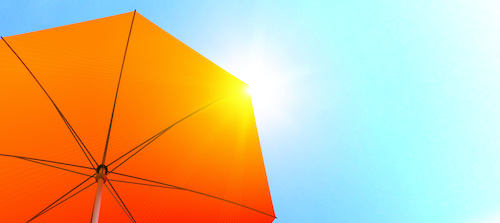
New Brunswick, N.J., July 13, 2021 –While the sun provides us with many benefits and supports our life, its ultraviolet rays can be harmful and damaging to our bodies, primarily our skin. According to the American Cancer Society, each year, more than 5.4 million basal cell and squamous cell skin cancers, which are the most common and are often related to sun exposure, are diagnosed in the United States. While skin cancer can be detrimental, it is also highly preventable.
Adam C. Berger, MD, FACS, chief of Melanoma and Soft Tissue Surgical Oncology, associate director for Shared Resources at Rutgers Cancer Institute of New Jersey and a professor of Surgery at Rutgers Robert Wood Johnson Medical School, shares more about UV safety and how to better protect yourself from the sun.
What is UV Radiation?
UV Radiation is a type of radiation that is emitted (naturally) by the sun but can also be emitted by unnatural sources such as tanning beds and incandescent and halogen lights. It has beneficial effects like the creation of Vitamin D but is linked to many types of skin cancer including basal cell and squamous cell carcinomas as well as melanoma.
What are some measures to minimize the risks that comes with sun exposure?
To minimize the risks of sun exposure, one should use sunscreen or sun block with an SPF of at least 30 and reapply frequently especially when out in the sun all day, with excessive sweating, and whenever you get out of the pool or ocean. You can also wear a hat, sit under an umbrella and wear a shirt or other clothing that has protection against the sun.
Do I still need to take precautions if it’s cloudy?
Yes. Your skin can still get UV radiation exposure when it is cloudy because the radiation can penetrate the clouds. You should really use the same protections against the sun when it is cloudy as you would when it is bright and sunny. This is also true when it is very cold and sunny out—you can still get a sunburn and UV radiation exposure.
What should be done if I'm worried I have skin damage from the sun?
You can make an appointment to see your primary care physician and/or a dermatologist to have a whole-body skin exam. Additionally, you should take some of the precautions outlined above whenever you go outside and will be exposed to the sun.
July is UV Safety Month, and it is important to spread the word about how important it is keep your skin from the harmful effects of UV rays. To learn more about skin cancer and sun safety, visit our skin cancer and sun safety resource center.
For journalists – contact:
Krista Didzbalis
Media Relations Assistant
908-812-6114
krista.didzbalis@rutgers.edu
For patient appointments/inquiries – contact:
844-CANCERNJ (844-226-2376)

